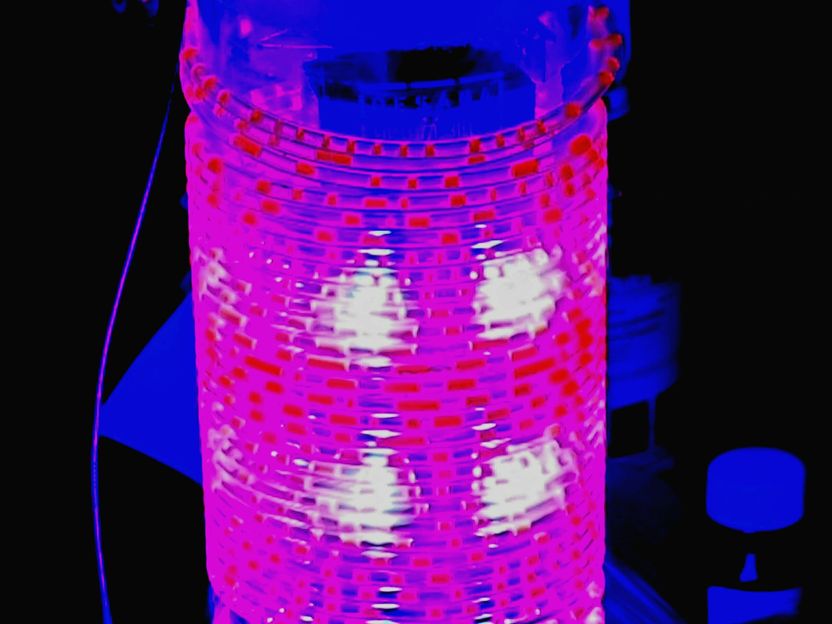Chemical Reactins on the Water Surface
Researchers develop a new synthesis method: Manufacturing chemical products more efficiently and environmentally friendly
Advertisement
Researchers at the University of Regensburg, led by Professor Dr. Burkhard König, Institute of Organic Chemistry, have developed a new synthesis method: Light reaction on a water surface allows chemical syntheses without the use of organic solvents or other reaction additives. This makes the production of chemical products more efficient and environmentally friendly. The results of years of research have now been published in the internationally journal Science.

Continuous photochemical reaction at the oil-water interface in the laboratory of Prof. König (University of Regensburg).
© Burkhard König
By forming chemical bonds between atoms, complex molecules such as those needed for medicines, crop protection products, or high-performance materials are prepared using synthetic chemistry. Such synthesis reactions typically require organic solvents, metal catalysts, and reagents such as acids or alkalis. Not all auxiliary materials and solvents can always be recycled, which results in waste.
Researchers from the University of Regensburg under the lead of Prof. Dr. Burkhard König, are now presenting a completely different way to synthesize complex molecules: the molecules to be reacted are applied to a water surface, where they form a thin film. Irradiation with violet light triggers a reaction that links both reaction partners. The new methodology exploits the film formation of water-insoluble organic molecules on the water surface (like an oil film on a puddle) to create ideal conditions for activation by light. The breadth of application of the technology was demonstrated in over 160 examples, including the synthesis of precursors of drugs. The light reaction on the water surface now allows chemical synthesis without the use of organic solvents or other reaction additives. This makes the production of chemical products more efficient and environmentally friendly. The results of years of research have now been published in the scientific journal Science.
The project has been running for about two years. During this time, numerous experiments were carried out to further develop and confirm the central discovery. Transferring the reaction to a flow reactor was a breakthrough, as the synthesis can be carried out continuously and larger amounts of product are also accessible. Spectroscopic measurements provided insight into the molecular mechanism of the reaction. In subsequent work, the synthesis technology will now be applied to other reactions to achieve the widest possible range of applications in the production of chemical products.
Original publication
Other news from the department science
Most read news
More news from our other portals
See the theme worlds for related content
Topic world Synthesis
Chemical synthesis is at the heart of modern chemistry and enables the targeted production of molecules with specific properties. By combining starting materials in defined reaction conditions, chemists can create a wide range of compounds, from simple molecules to complex active ingredients.

Topic world Synthesis
Chemical synthesis is at the heart of modern chemistry and enables the targeted production of molecules with specific properties. By combining starting materials in defined reaction conditions, chemists can create a wide range of compounds, from simple molecules to complex active ingredients.





























































